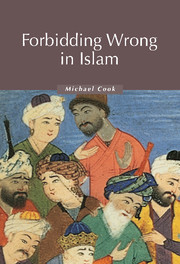Book contents
- Frontmatter
- Contents
- Preface
- Map
- 1 Introduction
- 2 The elements of the duty of forbidding wrong
- 3 How is wrong to be forbidden?
- 4 When is one unable to forbid wrong?
- 5 What about privacy?
- 6 The state as an agent of forbidding wrong
- 7 The state as an agent of wrongdoing
- 8 Is anyone against forbidding wrong?
- 9 What was forbidding wrong like in practice?
- 10 What has changed for the Sunnīs in modern times?
- 11 What has changed for the Imāmīs in modern times?
- 12 Do non-Islamic cultures have similar values?
- 13 Do we have a similar value?
- Index
7 - The state as an agent of wrongdoing
Published online by Cambridge University Press: 05 June 2012
- Frontmatter
- Contents
- Preface
- Map
- 1 Introduction
- 2 The elements of the duty of forbidding wrong
- 3 How is wrong to be forbidden?
- 4 When is one unable to forbid wrong?
- 5 What about privacy?
- 6 The state as an agent of forbidding wrong
- 7 The state as an agent of wrongdoing
- 8 Is anyone against forbidding wrong?
- 9 What was forbidding wrong like in practice?
- 10 What has changed for the Sunnīs in modern times?
- 11 What has changed for the Imāmīs in modern times?
- 12 Do non-Islamic cultures have similar values?
- 13 Do we have a similar value?
- Index
Summary
We pass now from the rhetorical claims of rulers to forbid the wrongdoing of others to their nasty but persistent habit of engaging in it themselves. We thus enter a rather different landscape. The wrongdoing of rulers, for all that it constitutes the warp and weft of the history the scholars recorded, is from our point of view of rather little conceptual interest; we will accordingly pass over it rather quickly. On the other hand, the responses of the scholars to this cornucopia of wrongdoing display a sharper focus than the discussions we looked at in the previous chapter. What they are mostly about is the bearing of doctrines of prospective harm in a context that the scholars saw as both highly significant and unusually fraught with peril. More precisely, what is involved is a special case of the question whether or not it is virtuous to forbid wrong where danger has voided the obligation.
The misdeeds of rulers
In his account of forbidding wrong, Ghazzālī gives a detailed and helpful survey of wrongs that are commonly met with in various contexts. He deals in turn with the mosque, the market-place, the street, the bath-house and the home (when guests are entertained there). By this point, however, he has tired of enumerating wrongs, and invites his readers to continue the survey for themselves. He mentions a few places to consider, one being the offices (dawāwīn) of rulers, but that is as far as he takes us.
- Type
- Chapter
- Information
- Forbidding Wrong in IslamAn Introduction, pp. 73 - 82Publisher: Cambridge University PressPrint publication year: 2003

